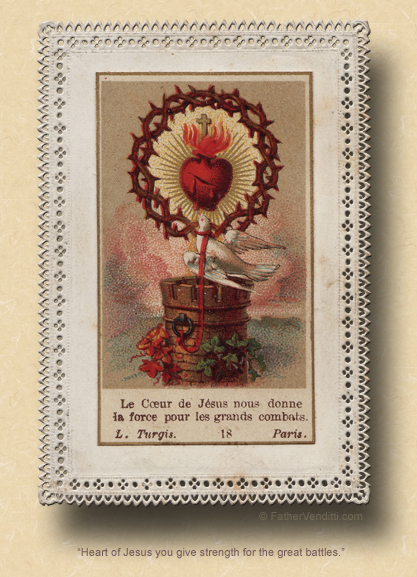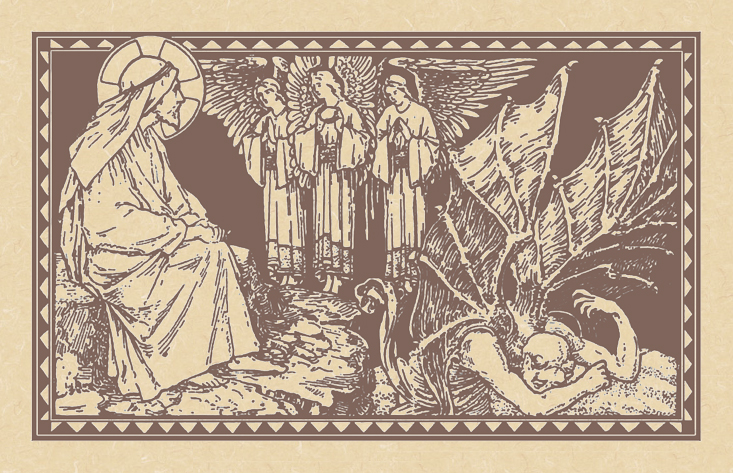Not a Therapist, but a Savior.
In the United States:
The First Friday of Lent; and, the Commemoration of Saint Katharine Drexel, Virgin.*
Lessons from the feria, according to the ordinary form of the Roman Rite:
• Isaiah 58: 1-9.
• Psalm 51: 3-6, 18-19.
• Matthew 9: 14-15.
|
Outside the United States:
The First Friday of Lent.
Lessons from the feria as above.
|
The First Friday of Lent.
Lessons from the feria, according to the extraordinary form of the Roman Rite:
• Isaiah 58: 1-9..
• [Gradual] Psalm 26: 4.
• [Tract] Psalm 102: 10.
• Matthew 5: 43-48; 6: 1-4.
The First Friday of the Great Fast; and, the Holy Martyr Eutropius & His Companions, Cleonicus & Basiliscus.**
Lessons for the Presanctified Liturgy, according to the Ruthenian recension of the Byzantine Rite:***
• Genesis 2: 20—3: 20.
• Proverbs 3: 19-34.
FatherVenditti.com
|
 7:49 AM 3/3/2017 — As is our custom here on the Fridays of Lent, we will pray the Stations of the Cross after Holy Mass today, but it is also First Friday, on which we typically have a Eucharistic Holy Hour; so, we will do both. Following the Postcommunion Prayer, we will expose the Blessed Sacrament, then you’ll have a few moments to pray silently before our Lord while I clean up after Mass, then we will pray the Stations together in the company of our Eucharistic Lord. We did this once last year, you’ll recall. Because our Lord will be present with us on the altar, however, I will not be facing the Stations mounted on the back wall, but will remain in front of our Lord for the service, and I would ask you to do the same during our praying of the Stations. The Stations should conclude well before 1:30, so you can have that time to speak privately with our Lord as well, or make use of the confessional for however much time there is left. 7:49 AM 3/3/2017 — As is our custom here on the Fridays of Lent, we will pray the Stations of the Cross after Holy Mass today, but it is also First Friday, on which we typically have a Eucharistic Holy Hour; so, we will do both. Following the Postcommunion Prayer, we will expose the Blessed Sacrament, then you’ll have a few moments to pray silently before our Lord while I clean up after Mass, then we will pray the Stations together in the company of our Eucharistic Lord. We did this once last year, you’ll recall. Because our Lord will be present with us on the altar, however, I will not be facing the Stations mounted on the back wall, but will remain in front of our Lord for the service, and I would ask you to do the same during our praying of the Stations. The Stations should conclude well before 1:30, so you can have that time to speak privately with our Lord as well, or make use of the confessional for however much time there is left.
On the surface, the disciples of John the Baptist seem to have a point. They approach our Lord and ask Him why He and His disciples do not fast the way they and the Pharisees do. They ask this question because fasting, all throughout the Old Testament, was part of the spirit of penance asked of man by God, and in both testaments we see fasting exemplified in all sorts of situations: before the beginning of some difficult task, in imploring God for the forgiveness of ones sins, to petition God in the face of some natural disaster, to prepare oneself for the performance of some mission—the last one being done by our Lord Himself, as He fasted for forty days and forty nights before beginning His public ministry, the example of which our own season of Lent is based.
So, you can see why John’s disciples ask our Lord this question. His answer is very important, and also hearkens to an understanding of the symbolism of the Old Testament: “Can the wedding guests mourn as long as the bridegroom is with them?” (Matt. 9: 15 RM3). The number of times the prophets of the Old Testament paraphrase the relationship between God and man in terms of a wedding feast, with God as the bridegroom, are too numerous to count—our Lord, Himself, will use it in more than one parable—so, what seems on the surface to be just a question about fasting becomes a very dramatic statement by our Lord, asserting His own divinity.
The never-ending attempt by well-meaning Christians to provide rational, psychological and therapeutic reasons for various Christian practices results, sometimes, in a lot of nonsense written about fasting: how it cleanses the body, clears the mind, disciplines the senses, and some of it is probably true, but those aren’t the reasons we fast. We fast to do penance for our sins, we fast because depriving the body sharpens the spirit and attunes us to hear the voice of God more clearly, and—most importantly of all—we fast because God asks it of us. He gave us His own example in the desert, and now He asks it of us.
That’s why the peculiar manner in which our Lord answers the disciples of John is so important: by turning a question about fasting into a statement of His divinity, He reminds us of the supernatural character of our life with Him. Our Lord is not a counselor, our Lord is not a political theorist, our Lord is not psychologist or therapist. Our Lord is a Savior. But in order to receive the redemption of our sins that His sacrifice offers us, we must be properly disposed, and fasting is a big part of that process. The Prayer after Communion, which will conclude our Mass today, expresses this thought perfectly: “We pray, almighty God, that, through partaking of this mystery, we may be cleansed of all our misdeeds, and so be suited for the remedies of your compassion.”

* In the ordinary form during Lent, memorials automatically become commemorations, the observance of which is optional. If observed, only the Collect of the saint is used, with everything else taken from the feria, and the color of the season worn. In the extraordinary form, third class feasts also become commemorations, but the observance is not optional; nevertheless, the commemoration is made by an additional Collect, Secret and Postcommunion added to those of the feria, and the color of the season is worn.
Katharine Drexel was a Philadelphia heiress and foundress of the Missionary Sisters of the Blessed Sacrament. She established some forty-nine foundations, including Xavier University in New Orleans, before her death on March 3rd, 1955, at the age of ninety-seven. She was canonoized by Pope Saint John Paul II on October 1st, 2000.
** Eutropius, Cleonicus and Basiliscus were born in Cappadocia, and martyred under Emperor Maximian (285-305).
*** Cf. the second footnote to the post here for an explanation of weekday services in the Byzantine Tradition during the Great Fast.
|

